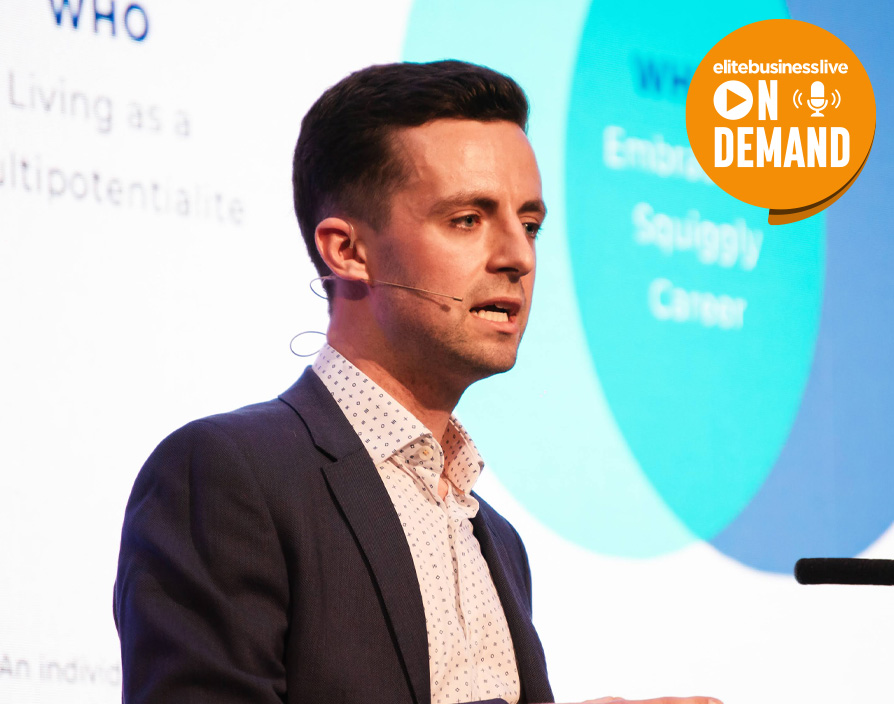The 9-to-5 workday is a well-known standard for all employees, but that’s quickly changing. Freelancing and self-employment are on the rise, and there’s been a rapid shift toward remote work. Charlie Rogers, founder of Undefinable Community and Founders’ Associate at The Portfolio Collective took to the stage at the Elite Business Live 2024 event, speaking about the future of careers and the evolution of the 9-5 workday. Charlie believes that the traditional career path is no longer the only option. Workers have many interests beyond their primary profession, and these interests can be leveraged to create a more fulfilling and sustainable career path. “The future careers are changing, and it’s changing pretty rapidly,” Charlie said.
He broke down an individual’s career development into a ‘who’, ‘what’ and ‘where’ concept, relating to a person’s continued career exploration. “The ‘who’ refers to an individual having multiple interests. “Those of us who are navigating their career, when they like doing many things. If you ask them who they are, they say I do x, y, and z…” Charlie explained. “Traditionally, you would have seen people earning via one source of income having a full-time job. But in the future of careers, what we’re really saying is that people are hunting by many sources of income, and I’ll go through a couple of the different models and how they look. “
The ‘where’ refers to how many different career paths an individual can take in their lifetime, which is becoming common with the Gen-Z workforce. “So previously, we might have seen people go and embrace one career throughout their entire lives and stick with it,” Charlie added. “But actually, really what we’re seeing now is there are many careers throughout our lives, and they’re really evolving and changing.”
Charlie talked about the intersection of career development, highlighting individuals with multiple interests and passions, and how they integrate their personal and professional interests to find an overlap. “Often the challenge is integrating the personal and the professional,” Charlie said. “Professionally, I might be a lawyer, but I might be a runner, is there a way in the future of careers of doing them both together? I believe there is, and I think it starts with understanding your purpose and how it threads together, like a golden thread of strings.”
Charlie spoke about four different types of modern workers: side hustlers, freelancers, multi-hyphenates and focus experts. “The first one is a side hustler,” he explained. “This one is particularly relevant for Gen Z, so those of us in full-time employment may work four days a week, or five days a week. But then on the side, you have this thing that you do on weekends or evenings, people call it that nine to five and then five, nine, and that’s a reality for a lot of Gen Z.
Next, we have the freelancer. You may be familiar with this one, it’s someone who works with many clients and sells only one service, they might do a lot of writing or consulting or public speaking. What every it is you do it with many clients. That’s the freelancer.”
He continued: “Then you have the multi-hyphenate. This is someone who does very different styles of working so they might do two days a week part-time as a teacher, then they might go and do another two days somewhere else as a lecturer, or they might spend one-day looking after their child at home, these people often earn via different sources of income, but they’re not so obviously linked.”
The fourth, the focus expert is the biggest opportunity, is about threading all of one’s different interests together. “The focus expert is the person who can point to a model and think about how they can better communicate it to people,” Charlie said. “For example, through public speaking, writing, understanding, consulting or doing a range of other services so they’re able to embrace them in a new idea or a fresh perspective that only they can speak to.”
It’s important to find your Ikigai, a well-known Japanese concept which translates into your ‘reason for being.’ With this, it becomes much clearer to plan a career path when you understand your life purpose. Charlie said: “People talk about how Ikigai and following your purpose both align to wanting to do what’s good for society, and something that can deliver the most impact but also, that’s going to earn you money as well.”
Share via:








































